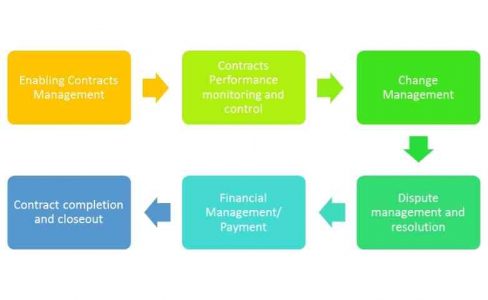
A contract administrator position description outlines the roles, responsibilities, and qualifications required for a contract administrator. It defines the scope of work, including tasks such as drafting, negotiating, and managing contracts, ensuring compliance, and mitigating risks. The job description also specifies the necessary skills, experience, and educational background for the position.
Contract administrator position descriptions play a crucial role in the recruitment and hiring process, providing a clear understanding of the expectations and requirements of the role. They help organizations attract qualified candidates who align with their business needs and ensure that the selected individual possesses the necessary capabilities to effectively manage contracts and safeguard the interests of the organization.
This article will delve deeper into the importance of contract administrator position descriptions, exploring their benefits, historical context, and the key elements they typically include. We will also discuss best practices for creating effective position descriptions and provide guidance on how to tailor them to specific organizational needs.
1.
The(Responsibilities) section of a contract administrator position description plays a critical role in outlining the core duties and expectations of the role. It provides a clear understanding of the scope of work and the level of responsibility associated with the position. By defining the primary tasks and accountabilities, organizations can ensure that candidates have a comprehensive understanding of the role’s requirements and can assess their own qualifications accordingly.
-
Drafting Contracts
Contract administrators are responsible for drafting various types of contracts, ensuring that they accurately reflect the agreed-upon terms and conditions between parties. This involves understanding the legal and commercial implications of each contract, as well as the specific needs and objectives of the organization.
-
Negotiating Contracts
Contract administrators are often involved in negotiating the terms and conditions of contracts with external parties, such as vendors, suppliers, or customers. This requires strong negotiation skills, the ability to identify and mitigate risks, and a deep understanding of contract law and principles.
-
Managing Contracts
Once contracts are executed, contract administrators are responsible for managing their performance and ensuring compliance with the agreed-upon terms. This involves monitoring contract milestones, tracking deliverables, and addressing any issues or disputes that may arise during the contract period.
By clearly defining the responsibilities associated with the contract administrator role, organizations can attract qualified candidates who possess the necessary skills, experience, and expertise to effectively manage contracts and safeguard the organization’s interests.
2.
The “Qualifications” section of a contract administrator position description plays a crucial role in defining the essential knowledge, skills, and experience required for the role. It serves as a screening mechanism for organizations to identify candidates who possess the necessary capabilities to effectively manage contracts and safeguard the organization’s interests.
-
Educational Background
Contract administrators typically require a bachelor’s degree in a related field, such as business administration, law, or project management. Some organizations may also consider candidates with an associate’s degree and relevant work experience.
-
Experience
Relevant work experience is a key requirement for contract administrator positions. Organizations typically seek candidates with several years of experience in contract management, negotiation, or a related field. This experience should demonstrate the candidate’s ability to handle complex contracts, negotiate favorable terms, and manage contracts effectively.
-
Skills
Contract administrators require a diverse range of skills to perform their duties effectively. These skills include:
- Knowledge of contract law and principles
- Strong negotiation skills
- Project management skills
- Excellent communication and interpersonal skills
- Attention to detail and accuracy
By clearly defining the qualifications required for the contract administrator role, organizations can attract qualified candidates who possess the necessary knowledge, skills, and experience to effectively manage contracts and mitigate risks.
3.
The “Experience” section of a contract administrator position description plays a crucial role in defining the level of professional experience required for the role. It outlines the number of years of relevant experience expected from candidates, as well as any specific industry or domain expertise that is preferred or required.
-
Number of Years of Experience
Organizations typically specify the minimum number of years of relevant experience required for contract administrator positions. This may vary depending on the level of seniority and the complexity of the role. For example, a senior contract administrator may be expected to have 5-7 years of experience, while a junior contract administrator may only require 2-3 years of experience.
-
Relevant Experience
Organizations also outline the specific types of relevant experience that are expected from candidates. This may include experience in drafting, negotiating, or managing contracts in a particular industry or domain. For example, a contract administrator position in the healthcare industry may require experience in managing contracts related to medical equipment or pharmaceutical products.
-
Industry or Domain Expertise
In some cases, organizations may require candidates to have specific industry or domain expertise. This is particularly important for roles that require specialized knowledge or experience in a particular field. For example, a contract administrator position in the construction industry may require experience in managing contracts related to construction projects.
-
Additional Qualifications
In addition to the number of years of experience and specific industry or domain expertise, organizations may also specify additional qualifications that are preferred or required for the role. These may include certifications, licenses, or training programs related to contract management or negotiation.
By clearly defining the experience requirements for the contract administrator role, organizations can attract qualified candidates who possess the necessary knowledge, skills, and experience to effectively manage contracts and safeguard the organization’s interests.
4.
The “Skills” section of a contract administrator position description plays a crucial role in defining the technical and soft skills required for the role. It outlines the specific capabilities and competencies that organizations seek in candidates to effectively manage contracts and safeguard the organization’s interests.
Technical skills are essential for contract administrators to perform their duties efficiently and effectively. Proficiency in contract management software is a key requirement, as these tools streamline the contract management process and enable administrators to track, manage, and store contracts in a centralized location. Other technical skills may include proficiency in legal research tools, document management systems, and project management software.
Soft skills are equally important for contract administrators to succeed in their roles. Strong communication skills are essential for effectively interacting with internal and external stakeholders, including legal counsel, clients, and vendors. Interpersonal skills are crucial for building and maintaining positive relationships, negotiating contracts, and resolving disputes. Attention to detail is paramount for ensuring that contracts are drafted, negotiated, and managed with the utmost accuracy and precision.
By clearly defining the skills required for the contract administrator role, organizations can attract qualified candidates who possess the necessary capabilities to effectively manage contracts and mitigate risks. This leads to improved contract management practices, reduced legal risks, and enhanced organizational performance.
5.
The “Scope of Authority and Responsibility” section of a contract administrator position description plays a critical role in outlining the level of authority and responsibility associated with the role. It defines the types of contracts that the contract administrator will be responsible for handling, the level of decision-making authority that they will have, and their reporting relationships within the organization.
Clearly defining the scope of authority and responsibility is essential for several reasons:
- It ensures that the contract administrator has a clear understanding of their role and responsibilities within the organization.
- It helps to avoid confusion and overlap with other roles and responsibilities within the organization.
- It provides a framework for evaluating the performance of the contract administrator.
The types of contracts that a contract administrator will be responsible for handling will vary depending on the size and complexity of the organization. In general, contract administrators will be responsible for drafting, negotiating, and managing a wide range of contracts, including:
- Commercial contracts
- Procurement contracts
- Employment contracts
- Leases
- Non-disclosure agreements
The level of decision-making authority that a contract administrator will have will also vary depending on the size and complexity of the organization. In general, contract administrators will have the authority to make decisions on a wide range of matters related to contract management, including:
- Approving or rejecting contracts
- Negotiating the terms and conditions of contracts
- Interpreting and enforcing contracts
- Managing contract risks
Contract administrators will typically report to a senior manager within the organization, such as the General Counsel or the Chief Financial Officer. The reporting relationship will vary depending on the size and complexity of the organization.
By clearly defining the scope of authority and responsibility for the contract administrator role, organizations can ensure that the role is properly aligned with the organization’s overall goals and objectives.
FAQs on Contract Administrator Position Description
This section addresses frequently asked questions (FAQs) about contract administrator position descriptions, providing concise and informative answers to common concerns and misconceptions.
Question 1: What is a contract administrator position description?
A contract administrator position description is a document that outlines the roles, responsibilities, qualifications, and scope of authority for a contract administrator within an organization. It serves as a guide for hiring managers and candidates alike, ensuring a clear understanding of the expectations and requirements of the role.
Question 2: Why is a contract administrator position description important?
A well-defined contract administrator position description is crucial for several reasons. It attracts qualified candidates with the necessary skills and experience, streamlines the hiring process, and provides a framework for evaluating the performance of the contract administrator once hired.
Question 3: What are the typical responsibilities of a contract administrator?
Contract administrators are responsible for a wide range of tasks, including drafting, negotiating, and managing contracts. They ensure that contracts are legally compliant, protect the organization’s interests, and align with its strategic objectives.
Question 4: What qualifications are typically required for a contract administrator position?
Contract administrator positions typically require a bachelor’s degree in a related field, such as business administration or law, along with several years of relevant experience in contract management or a similar role. Strong negotiation, communication, and analytical skills are also essential.
Question 5: What is the scope of authority for a contract administrator?
The scope of authority for a contract administrator varies depending on the size and structure of the organization. In general, contract administrators have the authority to negotiate and execute contracts within certain limits, make decisions related to contract performance, and manage contract risks.
Question 6: How can I create an effective contract administrator position description?
To create an effective contract administrator position description, focus on clearly outlining the roles, responsibilities, qualifications, and scope of authority for the role. Use specific and measurable language, and tailor the description to the specific needs of your organization.
In conclusion, a well-crafted contract administrator position description is essential for organizations to attract, hire, and retain qualified individuals who can effectively manage contracts and safeguard the organization’s interests.
Transition to the next article section: The Importance of Contract Administrator Position Descriptions
Tips for Creating an Effective Contract Administrator Position Description
A clear and comprehensive contract administrator position description is crucial for attracting and hiring qualified candidates who can effectively manage contracts and safeguard the organization’s interests. Here are some tips for creating an effective position description:
Tip 1: Define the Role and Responsibilities Clearly
Outline the specific tasks and responsibilities of the contract administrator, including drafting, negotiating, and managing contracts. Use clear and concise language, and be as specific as possible.
Tip 2: Specify the Qualifications and Experience Required
State the minimum qualifications and experience required for the position, including educational background, relevant work experience, and any necessary certifications or licenses.
Tip 3: Include the Scope of Authority and Decision-Making
Define the level of authority and decision-making power that the contract administrator will have, including the types of contracts they will be responsible for and the limits of their authority.
Tip 4: Use Clear and Professional Language
The position description should be written in a professional and objective tone, using clear and concise language. Avoid using technical jargon or ambiguous terms.
Tip 5: Tailor the Description to the Organization’s Needs
Customize the position description to reflect the specific needs and culture of your organization. Consider the industry, size, and structure of your organization when drafting the description.
Tip 6: Review and Update Regularly
Review and update the position description periodically to ensure that it remains accurate and relevant. This will help attract the most qualified candidates and ensure that the contract administrator is fully equipped to meet the evolving needs of the organization.
Tip 7: Get Feedback from Stakeholders
Seek feedback from key stakeholders, such as hiring managers, legal counsel, and the HR department, to ensure that the position description accurately reflects the role and responsibilities of the contract administrator.
Tip 8: Use Industry Benchmarks
Research industry benchmarks and best practices for contract administrator position descriptions to ensure that your description is competitive and aligns with industry standards.
By following these tips, organizations can create effective contract administrator position descriptions that will attract qualified candidates and support the organization’s contract management goals.
Conclusion:
A well-crafted contract administrator position description is an essential tool for organizations to attract, hire, and retain skilled professionals who can effectively manage contracts and safeguard the organization’s interests. By following the tips outlined above, organizations can create position descriptions that clearly define the role, responsibilities, and qualifications required for success.



